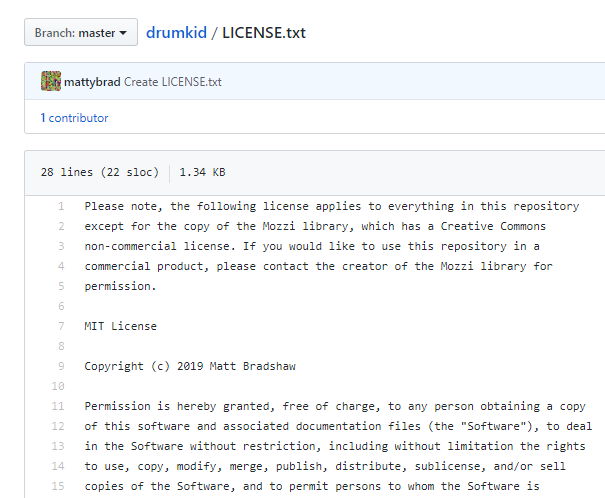This is a brief post where I will discuss exactly how open source DrumKid is (spoiler: as open source as I was able to make it).
My aim from the start of the DrumKid project has been to create a fully open source instrument, in terms of both hardware and software. I based the design on the Arduino platform, which is itself open source, and have shared all my schematics, CAD files, parts lists, etc under the MIT licence, so it's fair to say that the hardware side of my project is fully open source, which is great.
The software side is a little more complex. My code (which is also shared under the MIT licence) relies on two external libraries. One library which I make some use of is the ArduinoTapTempo library, which also uses the MIT licence. However, my code is based heavily on the Mozzi audio library, which is shared under a Creative Commons Non-Commercial licence.
Mozzi is a clever, extensive library that somehow squeezes complex audio out of an Arduino. The creator of Mozzi has (entirely fairly) released his code under this licence so that, while other people can use it to make cool projects, he reserves the right to negotiate a share of the profits if a commercial product makes use of his work.

I reached out to Mozzi's creator while I was developing DrumKid, and we quickly came to an amicable agreement about future profits, which means that DrumKid is "good to go" from a legal standpoint. However, it does leave this project in a sort of open source limbo. All the code that I have written is fully open source, and I personally have permission to use all the code that DrumKid relies on, but if anybody other than me started making and selling DrumKids, they would be in breach of Mozzi's licence (unless, of course, they also reached an agreement with its creator).
If somebody did want to sell DrumKid clones legally, one way would be to eliminate the need for the Mozzi library by "rolling their own" - while I do make extensive use of Mozzi, I only use a small subset of its features, so it wouldn't be that difficult to write some code that performed a similar function.
Personally, I'm happy to keep using Mozzi and pay a small fee to the developer who made DrumKid possible, but I thought this was an interesting aspect of open source culture: when money starts to get involved, things do get more complex!
 Matt Bradshaw
Matt Bradshaw
Discussions
Become a Hackaday.io Member
Create an account to leave a comment. Already have an account? Log In.